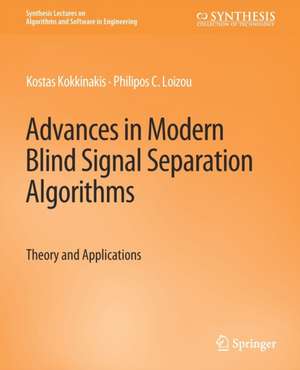Advances in Modern Blind Signal Separation Algorithms: Theory and Applications: Synthesis Lectures on Algorithms and Software in Engineering
Autor Kostas Kokkinakis, Philipos Loizouen Limba Engleză Paperback – 20 feb 2010
Din seria Synthesis Lectures on Algorithms and Software in Engineering
-
 Preț: 380.37 lei
Preț: 380.37 lei -
 Preț: 260.95 lei
Preț: 260.95 lei -
 Preț: 384.31 lei
Preț: 384.31 lei -
 Preț: 351.11 lei
Preț: 351.11 lei -
 Preț: 262.47 lei
Preț: 262.47 lei -
 Preț: 206.29 lei
Preț: 206.29 lei -
 Preț: 192.63 lei
Preț: 192.63 lei -
 Preț: 206.29 lei
Preț: 206.29 lei -
 Preț: 261.91 lei
Preț: 261.91 lei -
 Preț: 192.05 lei
Preț: 192.05 lei -
 Preț: 204.76 lei
Preț: 204.76 lei -
 Preț: 204.76 lei
Preț: 204.76 lei -
 Preț: 379.48 lei
Preț: 379.48 lei -
 Preț: 414.65 lei
Preț: 414.65 lei -
 Preț: 192.41 lei
Preț: 192.41 lei -
 Preț: 389.88 lei
Preț: 389.88 lei -
 Preț: 205.92 lei
Preț: 205.92 lei -
 Preț: 207.83 lei
Preț: 207.83 lei -
 Preț: 266.70 lei
Preț: 266.70 lei -
 Preț: 381.43 lei
Preț: 381.43 lei
Preț: 260.56 lei
Nou
Puncte Express: 391
Preț estimativ în valută:
49.86€ • 51.87$ • 41.17£
49.86€ • 51.87$ • 41.17£
Carte tipărită la comandă
Livrare economică 14-28 aprilie
Preluare comenzi: 021 569.72.76
Specificații
ISBN-13: 9783031003844
ISBN-10: 3031003845
Ilustrații: XI, 88 p.
Dimensiuni: 191 x 235 mm
Greutate: 0.2 kg
Editura: Springer International Publishing
Colecția Springer
Seria Synthesis Lectures on Algorithms and Software in Engineering
Locul publicării:Cham, Switzerland
ISBN-10: 3031003845
Ilustrații: XI, 88 p.
Dimensiuni: 191 x 235 mm
Greutate: 0.2 kg
Editura: Springer International Publishing
Colecția Springer
Seria Synthesis Lectures on Algorithms and Software in Engineering
Locul publicării:Cham, Switzerland
Cuprins
Fundamentals of blind signal separation.- Modern blind signal separation algorithms.- Application of blind signal processing strategies to noise reduction for the hearing-impaired.- Conclusions and future challenges.- Bibliography.
Notă biografică
Kostas Kokkinakis graduated from the University of Sheffield, United Kingdom, with the B.S. degree in Electronics, Control and Systems Engineering in 2000. He then received the M.S. degree in Microelectronics and Signal Processing from the University of London and the Ph.D. degree in Electronics from the University of Liverpool, in 2001 and 2005, respectively. Dr. Kokkinakis is currently a Research Assistant Professor in the Erik Jonsson School of Engineering and Computer Science at the University of Texas at Dallas, Richardson, TX, working on multi-microphone signal processing strategies for speech enhancement. The focus of his research work is on statistical signal processing, psychoacoustics, speech modeling and noise reduction. His research interests lie mainly in the development of blind signal separation strategies and their application to cochlear implant devices. His research is supported by funding from the National Institute on Deaf[1]ness and other Communication Disorders ofthe National Institutes of Health. Philipos C. Loizou received the B.S., M.S., and Ph.D. degrees, all in Electrical Engineering, from Arizona State University (ASU), Tempe, AZ, in 1989, 1991, and 1995, respectively. From 1995 to 1996, he was a Postdoctoral Fellow in the Department of Speech and Hearing Science at ASU, working on research related to cochlear implants. He was an Assistant Professor at the University of Arkansas at Little Rock from 1996 to 1999. He is now a Professor and holder of the Cecil and Ida Green Chair in the Department of Electrical Engineering, University of Texas at Dallas, Richardson, TX. His research interests are in the areas of signal processing, speech processing and cochlear implants. Dr. Loizou is currently working on the development of novel speech processing algorithms that will aid people with hearing impairment, and in particularly, people wearing cochlear implants. He is author of the book Speech Enhancement: Theory and Practice (CRC, 2007) and co-author of the textbook An Interactive Approach to Signals and Systems Laboratory (National Instruments, 2008). Dr. Loizou is a Fellow of the Acoustical Society of America and a member of the Speech Technical Committee of the IEEE Signal Processing Society. His research is supported by funding from the National Institute on Deafness and other Communication Disorders of the National Institutes of Health.
